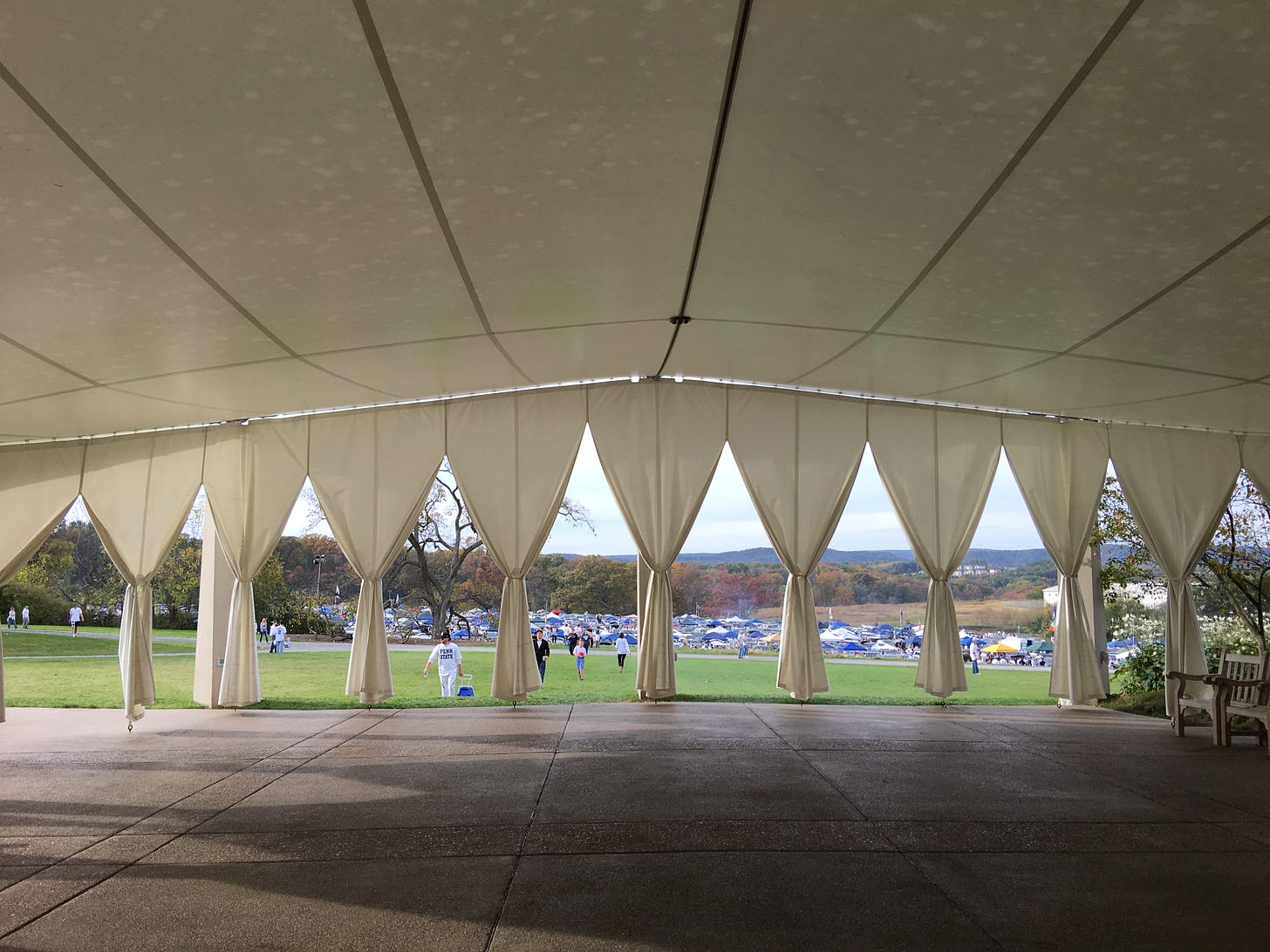Morning friends,
As the last Saturday of September curls into its autumnal magnificence, I am feeling both nostalgic and hopeful, as I generally do at this time of year, for . . . Penn State football.
When I was eight years old, my mother took me to New York City see Disney’s Beauty and the Beast on Broadway, and from that point forward, my childhood stance on my hometown of State College, PA, basically approximated Belle’s in the opening number. “There must be more than this provincial life!” I sang in my backyard, pining for a literary life of culture and sophistication; for museums and loft apartments and social engagements conducive to evening gowns. My campaign to go to boarding school began in sixth or seventh grade, and I was basically outta there by fourteen.
I didn’t appreciate State College’s charm and how fortunate I was to grow up there until at least my late twenties, but the one thing about it that I have unwaveringly adored, from my earliest memories until today, is Penn State football. When I say “unwaveringly adored,” I really mean it, to the point of embarrassment. If Penn State football is the official religion of State College, my childhood was nothing short of devout. In college, I would go to the UVa tailgates, then head back to my dorm to watch Penn State. I have cried over games—“wept” almost seems like the more appropriate word. The Sandusky scandal felt, in addition to a tragedy, like a cruel personal betrayal. Sometimes my anxiety during a close game is so palpable that I have to stop watching. To the casual observer this may look like fair-weather fandom, but it is actually because I care entirely too much.
As far as sports go, football might seem to diverge even more than most from “a literary life of culture and sophistication.” Literary fiction prefers tennis—as, on paper, do I. There’s Infinite Jest, of course, not to mention “Serve-and-Volley, Near Vichy,” one of my favorite short stories ever. Like writing, great tennis is largely a matter of individual virtuosity. Both are solitary, psychological, authoritarian, and unpredictable. Until the final match point, a game could technically go on forever, or at least for as long as you live. Less hypothetically, Tennis is a sport relatively merciful to age, with the potential for lifelong enjoyment. Certainly it offers the best sartorial options as well, though (amateur) skiing comes close, and, as I’ve remarked in the past, I’m surprised there isn’t more literary fiction written about it.
The novel I’m working on now myself is about basketball. Admittedly, I chose the sport mostly for certain of its mathematical properties and preoccupations, my second effort being equally concerned with statistics, probability, prediction, and randomness—and more about the spectators than the players. (Wilde: “It is the spectator, and not life, that art really mirrors.”) Basketball is no tennis, but with its smaller team size and suitability to cosmopolitan locales, still intuitively more literary than football.
And yet, only football could compel me to spend a crisp autumn evening in my silk pajamas reading about the likelihood of some five-star prospect (read: seventeen year old boy) to commit to Penn State instead of reading Proust. Even as I’m doing it, this seems bizarre and hypocritical. I would never let my own son play competitive football. It’s dangerous and violent! (He’s going straight to pee-wee Tennis.) And yet, as a spectator, I am emotionally invested in football as with no other sport. I recoil when players get hurt, but this hardly stops me from watching. Provided they jump back up again, I’m afraid football recalls for me a line of Jo’s in Gillian Armstrong’s Little Women, articulated by Winona Ryder in a perfect mix of self-critical pride: “I rather crave violence.”
Because football’s violence isn’t random. It’s regimented and contextual, and, if not strictly literary, at least narrative. Hollywood has recognized this where capital-L-Literature hasn’t (for all its big egos, film, like football, is a team sport). Friday Night Lights. Remember the Titans. I hate to say it, but Rudy. All of these possess what Penn State has given me: a riveting narrative, ineluctably entwined with “greatness.” In retrospect, this was specifically what I identified with as a child. For most of the year, the joke is that State College, located in the geographic center of Pennsylvania, is “equally inaccessible from everywhere.” But six or so Saturdays every fall, the world seemed to come to us. Penn State football was the one thing about State College that seemed to make it—to make me—exceptional. When I wasn’t at the game myself, I could still hear the live cheers from my house: half the stadium screaming “WE ARE…” the other half responding in unison: “PENN STATE!” I took this sentiment literally. When Bobby Engram made a one-handed grab or LaVar Arrington leapt, their greatness seemed, if not an all-out reflection of my own, then at least a harbinger of it. And isn’t this what’s so appealing about this genre of fandom? The inherent belonging to something beyond yourself? The trappings of greatness from the comfort of your couch? The football spectator’s pleasure exists precisely in the absence of authorship; what it is actually akin to, and perhaps the reason I’ve always loved it, is the pleasure of reading.
At least, that is, when your team is winning. Which I greatly hope Penn State will do today, and for the rest of the season. Did you see “us” against Auburn last week? This team has a chance at the CFP, baby.
Thanks for reading, whether or not you’re a fan—
Natasha






